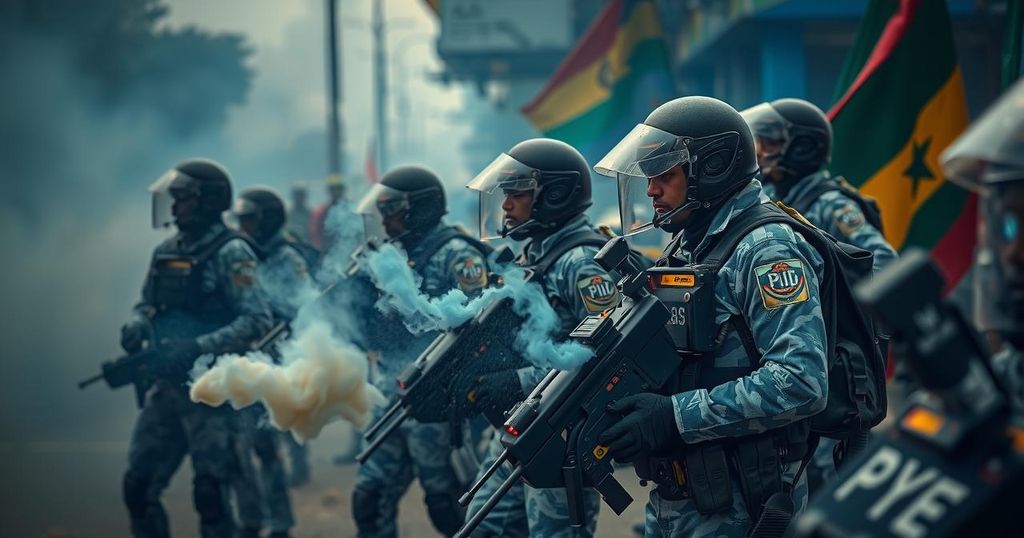In Mozambique, police used tear gas against opposition leader Venancio Mondlane amidst rising political tensions following disputed elections and the murders of two key opposition members. As Mondlane condemned the elections as fraudulent, calls for protest led to clashes in the capital, Maputo. The ruling Frelimo party, which has been in power since 1975, faces accusations of electoral misconduct and suppression of dissent, drawing international scrutiny and calls for investigations into recent violence.
Police in Mozambique clashed with opposition supporters on Monday, deploying tear gas against leading opposition politician Venancio Mondlane as he addressed the media. This incident follows heightened tensions in the nation after a disputed election and the recent assassinations of two key opposition figures. During a press event in Maputo, Mondlane spoke near the site where his lawyer and a prominent party spokesperson were murdered by unidentified attackers on Friday night. A video shared by Mondlane on his Facebook page depicted the panic as he, his aides, supporters, and journalists sought shelter from the tear gas canisters. Reports indicated that one journalist sustained injuries during the chaos. Earlier, Mondlane had called for a nationwide labor strike, urging citizens to refrain from work in protest against what he and other parties allege to be election fraud. The elections, held on October 9, were anticipated to further solidify the dominance of the ruling Front for the Liberation of Mozambique (Frelimo) party, which has governed since Mozambique’s independence in 1975. While official preliminary results indicate a significant lead for Frelimo’s candidate, Daniel Chapo, Mondlane’s independent candidacy was backed by the newly formed Podesa party. Should Chapo prevail, he will take over from President Filipe Nyusi, who has reached the term limit. The slayings of opposition figures, including Mondlane’s lawyer Elvino Dias, have intensified the political climate in Mozambique. These killings are perceived to be politically motivated, particularly as Dias was reportedly instrumental in formulating challenges to the election outcomes. Both the European Union and the United Nations have condemned the violence, with calls for immediate investigations into the killings. Mondlane expressed concerns regarding police activity at his residence before the protests, stating, “The whole of last night, police cars were at my doorstep. I was trying to find other ways to leave the house without being noticed. I did. I won’t say how.” Such incidents highlight the ongoing assault on democratic processes and civil liberties in Mozambique, where Frelimo has faced allegations of electoral fraud and suppression of dissent.
The political environment in Mozambique has been fraught with tension, especially following the recent presidential elections. The ruling party, Frelimo, has held power since the nation gained independence in 1975, with recurrent claims of electoral fraud and suppression of opposition. The vitality of democratic processes is under scrutiny as the opposition faces violence and intimidation. The assassinations of high-profile opposition figures serve as a grim reminder of the risks associated with political dissent in the country. Calls from international bodies for investigations into these crimes underscore a growing concern for human rights in Mozambique’s political landscape. The recent election cycle has seen the emergence of new political parties challenging the long-established Frelimo, indicating potential shifts in Mozambique’s political dynamics.
The escalating violence and political repression in Mozambique represent significant challenges to the nation’s democratic integrity. The firing of tear gas on opposition leader Venancio Mondlane during a press event, following high-profile assassinations, illustrates a precarious political climate. With Frelimo expected to maintain power amidst claims of electoral fraud, demands for accountability and justice from the international community may play a crucial role in shaping Mozambique’s political future. The situation remains on edge as outcomes of the election and responses from both the government and the opposition unfold.
Original Source: apnews.com






